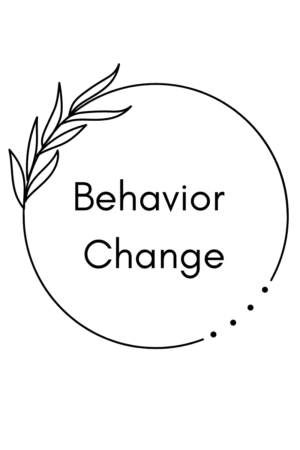
Behavior Change
Changing your behaviors does not happen overnight.
In this article, we will talk about the six stages of behavior change so that you can reach your goals. Whether you want to start a consistent exercise routine, start eating healthier or simply make time for mindfulness, changing your habits and behaviors requires a process.
The Pre-Contemplation Stage
During this stage, you do not think you have a problem. If others approach you about making a behavior change, you might even get defensive.
For example, you might give no thought to the fact that you do not exercise or eat poorly.
The Contemplation Stage
During the contemplation stage, you have become aware that you have a problem or that you could change your behavior for positive results.
You start to think about doing things differently. For instance, you see yourself exercising or eating a more nutritious diet.
You are not ready to begin the new behavior yet, but you are beginning to think about it.
Preparation Stage
During this stage, you begin to research the behaviors you want to implement.
For instance, if you want to begin an exercise routine, you may research personal training, a beginner walking routine or a new park in the area which you could use for walking.
You start some research on good practices and reach out to your support network with questions.
Action Phase
During the action phase, you begin to do the activity.
For example, you commit to three walks per week for thirty minutes. Or you work with a trainer two times per week. You start taking action on your goals.
Maintenance Phase
During the maintenance phase, you maintain your new behavior changes with continued effort. You realize that you will need to continue some effort to maintain your changes. For example, you might have to keep up with the three walks per week.
Hopefully, you continue this phase forever. If you do not, you may slip into a relapse phase.
Relapse Phase
During the relapse phase, you start relapsing on your new behavior. Maybe you stop exercising all together, or you slip back into watching TV way too late into the night.
You continue this phase until you realize you have gotten off track. This leads you back into the pre-contemplation phase, or the first phase of behavior change. The cycle begins again.
Why Understand the Phases of Behavior Change?
Having more awareness of the stages of behavior change can help you determine what phase you are in. It can also help you determine the next steps for you to get closer to your plan.
Using this framework, you can determine an entire action plan to achieve your goals.
For instance, let’s say you know you need to start going to bed earlier. You see yourself going to bed early in your mind, but you cannot get yourself to do it.
You realize you are in the contemplation phase and you need to do a bit more prep work before you are ready for the action phase. For instance, you might create a plan to research five tips to help you go to bed early.
You research your five tips and create an action plan to help you achieve your goal. You realize you need to set a timer, start a wind down routine an hour before bed, and turn off your electronics thirty minutes before bed.
Then you can set a date and a schedule the day you want to begin your new habit. You follow the tips you learned in the preparation phase so that you can take action.
You continue your new habit for 60 days until it becomes a habit. Then, you maintain your habit by continuing with it, although by this point your new routine takes less energy and conscious work than in the beginning.
Whatever your goal, you could use the stages of behavior change to make more progress in any area of your life, from fitness to nutrition to your personal life.
Final Thoughts
While behavior change may seem simple, it actually requires many different steps. Did this article help you gain some clarity of your specific phase of behavior change? If so, did it help you determine the next steps to take? Let me know in the comment section below.